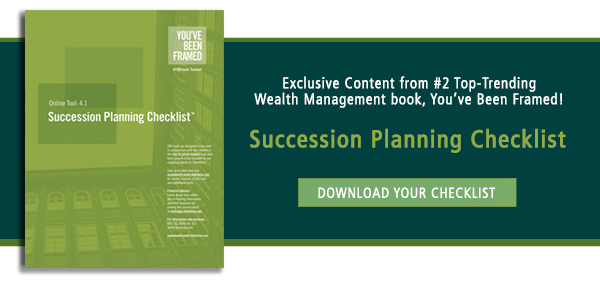The Most Overlooked Fiduciary Duty
 Imagine sitting down with one of your clients for a financial planning meeting and focusing exclusively on their short-term financial needs and concerns. When the client broaches the subject of retirement planning, you turn to them and with a wave of your hand say, “Let’s just focus our attention on more immediate needs…we’ll deal with your retirement challenges when we get a lot closer to that date.” Not exactly a tactic that any self-respecting advisor would advocate, yet, it’s essentially the approach that 60% of advisors who don’t have a formal succession plan are currently taking.
Imagine sitting down with one of your clients for a financial planning meeting and focusing exclusively on their short-term financial needs and concerns. When the client broaches the subject of retirement planning, you turn to them and with a wave of your hand say, “Let’s just focus our attention on more immediate needs…we’ll deal with your retirement challenges when we get a lot closer to that date.” Not exactly a tactic that any self-respecting advisor would advocate, yet, it’s essentially the approach that 60% of advisors who don’t have a formal succession plan are currently taking.
I often talk about the big, fat lie that advisors tell, even devoting an entire chapter to it in my book You’ve Been Framed. You’ve promised your clients that the firm will always be there to guide them through all of life’s transitions – loyal and steadfast, a rock-solid partner. Truth be told, however, more than half of you are leaving those clients exceedingly vulnerable by not preparing your practice for the inevitability of not having you at the helm.
Envisioning and embracing the future
While the succession planning process isn’t simple, it’s by no means some massive and complex undertaking that needs to be feared and dreaded. There are plenty of tools and resources available through ClientWise and other firms to assist you in the process.
When crafting a financial advisor succession plan, however, keep in mind that your business may look radically different in the future than it does today. Technological trends, economic cycles, changing client needs and demands, and the shifting regulatory landscape will all impact the structure, size and ultimately the value of your business. You need to be able to step into the future and respond to factors that may shape your business and impact your exit strategy. How many of you, for instance, have carefully considered the motivating factors that influence millennials, knowing that down the road both a sustainable client base and a sustainable staff base will need to include them.
You have put a lifetime’s worth of energy, effort, and emotion into creating and nurturing a highly successful and respected business. A great deal of your personal identity is likely tied to your role as leader. So it’s only natural that the idea of ceding control of what you have built to others might foster a certain degree of procrastination. Overcoming that urge requires that you focus on two key objectives: doing everything you can to ensure the best outcome for your current and future clients; and determining what you want both financially and emotionally for the next phase of your life beyond your current firm. A plan guided principally by those two goals will ensure a successful exit whenever the time comes.
For a few more articles on Succession Planning from ClientWise, see below:
-
Succeeding at Succession for Financial Advisors
-
The Clock is Ticking: Succession Planning for Advisors
-
Financial Advisors: Questions to Enhance Your Succession Planning
-
Part I: Start Planning While You’re Still Growing
Coaching Questions from this article:
-
How will you use the future you want for yourself to design an exit that is not only financially rewarding, but emotionally rewarding as well?
-
When you think about the future of the advisory business, what trends, regulations, economic and demographic changes do you envision needing to prepare for in order to ensure the business is prepared?
-
What steps can you begin taking right now to mitigate the impact of your future departure on your practice, your team, your clients and yourself?
Like this blog? Click "Follow" in the upper right hand corner to receive all of the eLibrary Blog updates!


